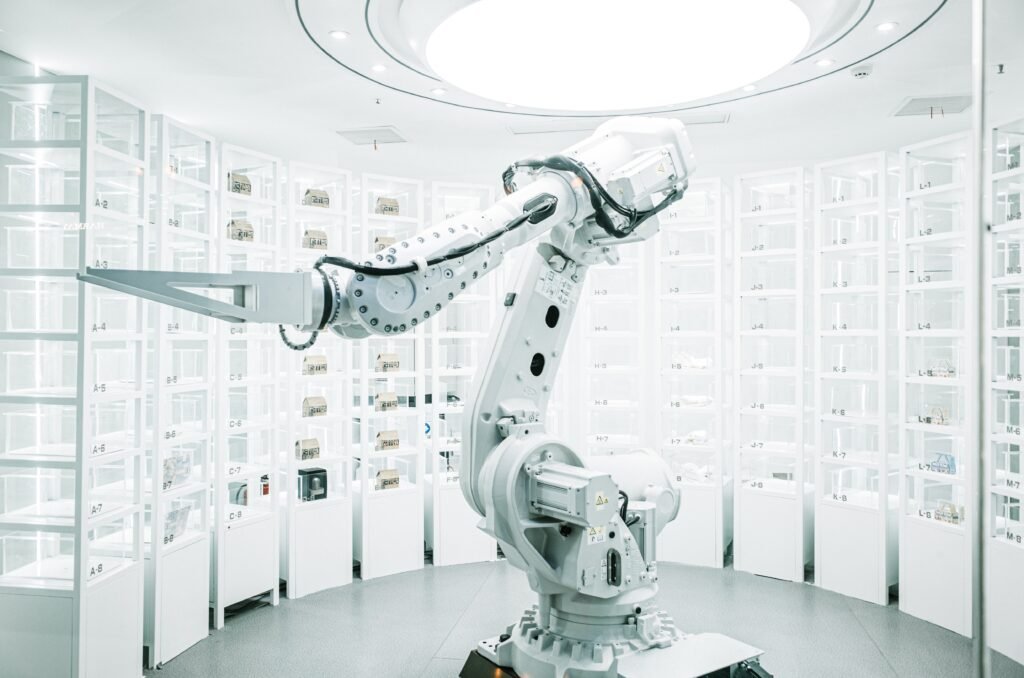Artificial Intelligence (AI) has become a buzzword in recent years, but do you truly understand what it means? In simple terms, AI refers to the development of computer systems that can perform tasks that typically require human intelligence. These tasks range from voice recognition and decision-making to problem-solving and even creative thinking. However, AI is not just limited to what we see in sci-fi movies; it is a rapidly advancing field that has the potential to revolutionize various industries and enhance our everyday lives. So, let’s unpack the intricacies of AI and discover how this exciting concept is reshaping the world we live in.
Definition of Artificial Intelligence
Artificial Intelligence, often abbreviated as AI, refers to the field of science and technology that aims to create intelligent machines that can perform tasks that would typically require human intelligence. AI involves the development of computer systems or programs that have the ability to think, reason, learn, and make decisions, mimicking human cognitive processes. These intelligent machines are designed to understand and analyze complex data, recognize patterns, solve problems, and ultimately improve efficiency and productivity in various industries.
The Origins of Artificial Intelligence
Early Concepts
The origins of Artificial Intelligence can be traced back to ancient times, where the idea of creating artificial beings with human-like intelligence existed in myths and folklore. However, the concept of AI as we know it today really began to take shape during the mid-20th century.
The Dartmouth Conference
In 1956, a significant milestone in the development of AI was reached with the Dartmouth Conference. This conference, held at Dartmouth College in New Hampshire, brought together a group of brilliant scientists and mathematicians who shared a common interest in exploring the possibilities of creating intelligent machines. It marked the birth of AI as a distinct field of study and laid the foundation for further research and advancements in the years to come.
The AI Winter
Despite the initial excitement and promising progress in the field of AI, there was a period of stagnation and reduced funding known as the AI Winter. This occurred from the late 1970s to the mid-1980s when the high hopes for AI were met with disappointment due to unrealistic expectations and overhyped claims. Researchers struggled to deliver on the grand vision of AI, leading to a decline in public and financial support.

Types of Artificial Intelligence
Narrow AI
Narrow AI, also known as weak AI, refers to AI systems that are designed to perform a specific task or a set of specific tasks. These systems excel at a particular domain and can exhibit impressive performance within their defined scope. Examples of narrow AI include speech recognition systems, image classification algorithms, and recommendation engines. While narrow AI is highly specialized and task-oriented, it lacks the broad understanding and flexibility of human intelligence.
General AI
General AI, also known as strong AI or human-level AI, refers to AI systems that possess the ability to understand, learn, and apply knowledge in a manner similar to humans. General AI aims to replicate human intelligence across a wide range of tasks and domains, possessing the capacity for abstract reasoning, problem-solving, and self-awareness. Achieving true general AI remains a challenge due to the complexity of human cognition.
Superintelligent AI
Superintelligent AI refers to AI systems that surpass human intelligence in virtually all aspects, including creativity, problem-solving, and learning abilities. These hypothetical AI systems, also known as artificial superintelligence, are considered to be vastly more advanced and capable than human beings. Superintelligent AI poses significant ethical and existential concerns, as its potential impact on humanity and the world at large is uncertain.
Applications of Artificial Intelligence
Machine Learning
Machine Learning is a branch of AI that focuses on the development of algorithms and statistical models that enable computers to learn from and make predictions or decisions based on data without being explicitly programmed. Machine Learning algorithms find applications in various fields, such as fraud detection, customer segmentation, medical diagnosis, and personalized recommendation systems.
Natural Language Processing
Natural Language Processing (NLP) is a subfield of AI that focuses on enabling computers to understand, interpret, and generate human language. NLP is applied in numerous applications, such as voice assistants, chatbots, language translation, sentiment analysis, and information retrieval.
Computer Vision
Computer Vision is an area of AI that enables computers to interpret and understand visual information from images or videos. Computer Vision algorithms are used in image recognition, object detection, facial recognition, autonomous vehicles, and surveillance systems.
Robotics
Robotics combines AI, mechanical engineering, and computer science to create intelligent robots that can perform tasks autonomously or with human guidance. AI-powered robots find applications in industries such as manufacturing, healthcare, agriculture, and exploration.
Expert Systems
Expert Systems, also known as knowledge-based systems, are AI systems that possess specialized knowledge and expertise in a particular domain. These systems rely on rules, heuristics, and knowledge bases to provide intelligent recommendations, advice, or problem-solving capabilities. Expert Systems are used in fields such as medicine, finance, and engineering.

Benefits of Artificial Intelligence
Enhanced Efficiency
One of the primary benefits of AI is its ability to enhance efficiency in various industries. AI-powered systems can perform tasks faster and with greater accuracy than human counterparts. Whether it’s automating routine processes or assisting professionals in complex decision-making, AI has the potential to streamline operations, increase productivity, and improve overall efficiency.
Improved Decision Making
AI has the potential to transform decision-making processes by providing valuable insights and analysis of complex data. By employing advanced algorithms and machine learning techniques, AI systems can uncover patterns, trends, and correlations that may not be immediately evident to humans. This enables businesses and organizations to make more informed decisions based on data-driven insights and predictions.
Automated Problem Solving
AI can automate problem-solving tasks that would typically require human intervention. Through machine learning and logical reasoning, AI systems can analyze vast amounts of data, identify problems, and generate effective solutions. This not only saves time but also allows humans to focus on more creative and strategic aspects of their work.
Time and Cost Savings
By replacing manual tasks with AI-powered automation, businesses can achieve significant time and cost savings. Repetitive and mundane tasks can be delegated to AI systems, freeing up human resources for more critical and value-added activities. Additionally, AI can optimize processes, detect inefficiencies, and reduce operational costs, leading to improved profitability.
Challenges of Artificial Intelligence
Ethical Considerations
As AI becomes increasingly sophisticated and autonomous, ethical considerations arise. Questions regarding privacy, data governance, algorithmic bias, and the potential impact on societal values and norms must be addressed. Striking a balance between advancing AI technology and maintaining ethical boundaries is crucial to ensure AI is developed and deployed responsibly.
Job Displacement
The rise of AI presents concerns about the potential displacement of human jobs. Automation and AI systems can perform tasks traditionally carried out by humans, leading to concerns about unemployment and economic inequality. However, proponents argue that AI can also create new job roles and opportunities, requiring an emphasis on reskilling and upskilling the workforce.
Data Privacy
AI relies heavily on data, raising concerns about privacy and data protection. As AI systems collect, analyze, and process vast amounts of user data, there is a risk of unauthorized access, breaches, or misuse. Stricter regulations and robust privacy frameworks are crucial to safeguard individuals’ data and address privacy concerns associated with AI.
Lack of Transparency
The lack of transparency in AI algorithms and decision-making processes is a significant challenge. As AI systems become more complex and sophisticated, it becomes difficult to understand why and how decisions are made. This raises concerns about accountability, fairness, and potential biases inherent in AI systems. Ensuring transparency and interpretability in AI algorithms is essential for building trust and mitigating unintended consequences.

AI in Everyday Life
Virtual Assistants
Virtual Assistants, such as Amazon’s Alexa or Apple’s Siri, have become a common part of daily life. These AI-powered voice-controlled systems are designed to understand and respond to natural language commands, providing users with information, performing tasks, and managing smart home devices.
Smart Home Devices
AI is revolutionizing the concept of smart homes, where everyday devices are connected to a network and can be controlled remotely or autonomously. Smart home devices, such as thermostats, lighting systems, security cameras, and appliances, can be intelligently controlled and optimized to enhance comfort, convenience, and energy efficiency.
Recommendation Systems
AI-powered recommendation systems have become integral to our digital experiences. These systems analyze user preferences, behavior, and historical data to provide personalized recommendations in areas such as e-commerce, streaming services, social media, and online content.
Autonomous Vehicles
AI plays a crucial role in the development of autonomous vehicles. By combining computer vision, machine learning, and sensor technology, autonomous vehicles can perceive their surroundings, make real-time decisions, and navigate safely without human intervention. Autonomous vehicles have the potential to revolutionize transportation, improving safety, efficiency, and accessibility.
Ethical Concerns of Artificial Intelligence
Bias and Discrimination
AI systems can perpetuate biases and discrimination present in historical data, leading to biased outcomes. This can have serious consequences in areas such as hiring, lending, and criminal justice. It is essential to address biases and ensure fairness, diversity, and inclusion in the design and deployment of AI systems to prevent the amplification of societal inequalities.
AI Surveillance
As AI capabilities advance, concerns about surveillance and privacy are amplified. AI-powered surveillance systems can monitor and analyze vast amounts of data, leading to potential infringements on personal privacy, civil liberties, and human rights. The responsible and ethical use of AI in surveillance is crucial to maintain a balance between security and individual freedoms.
Autonomous Weapons
The development of autonomous weapons raises ethical concerns surrounding the deployment of AI in military contexts. Lack of human control and accountability in AI-powered weapons can have severe consequences, including the potential for unintended harm, loss of civilian lives, and escalation of conflicts. Establishing international regulations and ethical guidelines is essential to ensure responsible use of AI in the military domain.
The Future of Artificial Intelligence
Limitless Possibilities
The future of AI holds limitless possibilities. As technology continues to advance, AI has the potential to revolutionize various industries, including healthcare, finance, transportation, and education. AI-powered systems may pave the way for breakthroughs in disease diagnosis and treatment, personalized learning experiences, improved financial decision-making, and sustainable mobility solutions.
Augmented Intelligence
Augmented Intelligence refers to the collaboration between humans and AI systems to enhance human capabilities and decision-making rather than replacing them. Instead of viewing AI as a threat, the concept of augmented intelligence emphasizes the augmentation of human intelligence with AI-powered tools and assistance. This collaborative approach can lead to more effective problem-solving, creativity, and innovation.
Human-Machine Collaboration
The future of AI lies in human-machine collaboration, where humans and AI systems work together to achieve common goals. By combining human creativity, intuition, and ethical values with the processing power and analytical capabilities of AI, new frontiers can be explored. Ethical frameworks and guidelines will be crucial to ensure a harmonious and sustainable collaboration between humans and AI systems.
Conclusion
Artificial Intelligence has come a long way since its early conceptualization, with significant advancements in AI technology and its applications. From specialized narrow AI to the potential of superintelligent AI, the field of AI continues to evolve rapidly, offering numerous benefits and posing unique challenges. The integration of AI into everyday life is already evident through virtual assistants, smart home devices, recommendation systems, and autonomous vehicles. However, ethical considerations and concerns about job displacement, data privacy, bias, and transparency must be addressed to ensure responsible and beneficial use of AI in the future. As AI continues to shape the world, the potential for innovation, efficiency enhancement, and collaboration between humans and machines is truly exciting, promising a future where artificial and human intelligence work in harmony for the betterment of society.






